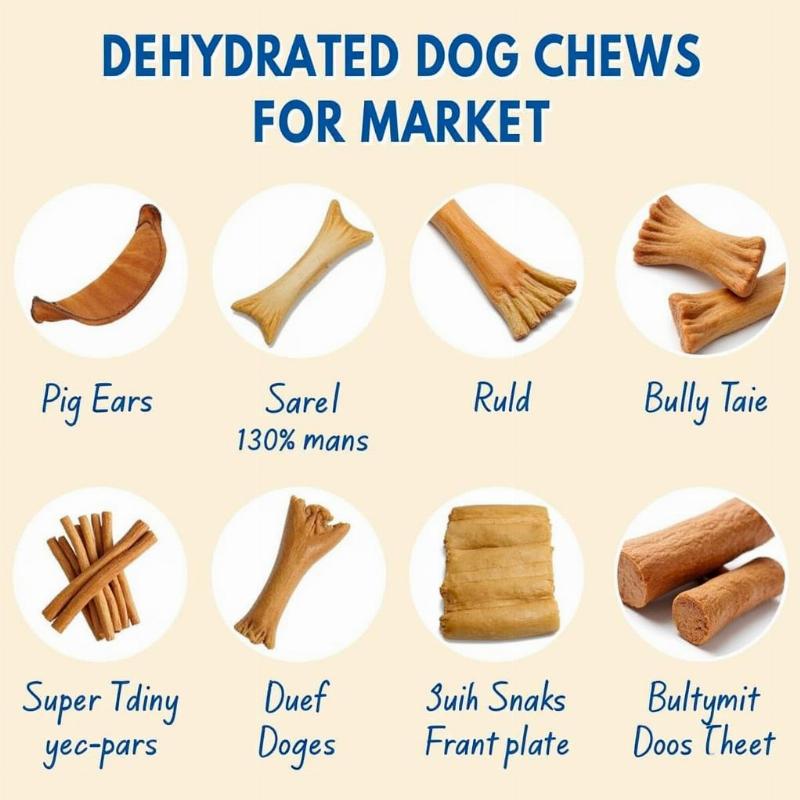Dehydrated pig ears for dogs are a popular chew treat in the US, offering a long-lasting and satisfying experience for many pups. But are they the right choice for your furry friend? This comprehensive guide will explore the benefits, risks, and best practices for feeding your dog dehydrated pig ears, providing you with the information you need to make an informed decision. We’ll cover everything from nutritional value to potential hazards, ensuring you can keep your canine companion happy, healthy, and safe.
Understanding the Appeal of Dehydrated Pig Ears
Why are dehydrated pig ears so appealing to dogs? Simply put, they’re naturally delicious and offer a satisfying chewing experience. The texture is tough and chewy, which can help clean teeth and satisfy a dog’s natural instinct to gnaw. This can be especially beneficial for teething puppies or dogs prone to anxiety, as chewing can be a calming activity. Plus, the natural aroma of pig ears is highly enticing for many dogs, making them a high-value treat.
Nutritional Benefits and Considerations
Dehydrated pig ears offer some nutritional benefits, including chondroitin and glucosamine, which can support joint health. They are also a good source of protein. However, they are relatively high in fat and calories, so they should be given in moderation. Overfeeding can lead to weight gain and other health issues. It’s crucial to consider your dog’s overall diet and activity level when incorporating dehydrated pig ears into their treat routine. Consult with your veterinarian to determine the appropriate serving size for your individual dog.
Potential Risks and Safety Precautions
While generally safe, dehydrated pig ears do come with some potential risks. Some dogs may experience digestive upset, particularly if they consume a large quantity. There’s also a risk of choking if a dog swallows a large piece whole. Always supervise your dog while they’re enjoying a pig ear and remove any small pieces or splinters that break off. Choose high-quality pig ears from reputable sources to minimize the risk of contamination.
Choosing the Right Dehydrated Pig Ears for Your Dog
Not all dehydrated pig ears are created equal. Look for products sourced and processed in the US to ensure they meet safety and quality standards. Avoid pig ears that are overly processed, dyed, or contain artificial flavors or preservatives. Opt for natural, single-ingredient options. Reading reviews and checking for certifications can help you identify reputable brands.
Are Dehydrated Pig Ears Right for Every Dog?
Dehydrated pig ears are not suitable for all dogs. Puppies with developing teeth may not be able to handle the tough texture, and senior dogs with dental issues may find them difficult to chew. Dogs with certain health conditions, such as pancreatitis, should avoid high-fat treats like pig ears. Always consult your veterinarian before introducing any new treats to your dog’s diet.
 Variety of Dehydrated Dog Chews, Including Pig Ears
Variety of Dehydrated Dog Chews, Including Pig Ears
Conclusion
Dehydrated pig ears can be a satisfying and enjoyable treat for many dogs when given responsibly. By understanding the potential benefits and risks, and following the safety guidelines outlined in this article, you can make informed choices about your dog’s treats. Remember to always prioritize your dog’s health and well-being when selecting any chew treat.
FAQ
- How often can I give my dog a dehydrated pig ear? Due to their high fat content, pig ears should be given sparingly. Consult your veterinarian for specific recommendations based on your dog’s breed, size, and overall health.
- What should I do if my dog swallows a large piece of pig ear? Contact your veterinarian immediately. A large piece could cause a blockage.
- Are there alternatives to dehydrated pig ears? Yes, there are many other chew treats available, such as bully sticks, dental chews, and rawhide alternatives.
- Where can I buy high-quality dehydrated pig ears? Look for reputable pet supply stores or online retailers that specialize in natural dog treats.
- Can I give my puppy a dehydrated pig ear? It’s generally recommended to wait until a puppy’s adult teeth have fully come in before giving them a pig ear.
- How can I tell if a pig ear is good quality? Look for pig ears that are light in color, have a natural smell, and are free from any artificial additives.
- What are the signs of a digestive upset in dogs? Vomiting, diarrhea, and loss of appetite can indicate digestive issues.
Beautdogs.us is your premier online resource for comprehensive dog care information, breed-specific advice, and a curated selection of products tailored to the American pet parent. Whether you’re a seasoned dog owner or just starting your journey, Beautdogs.us provides expert guidance to ensure a happy, healthy life for your canine companion. We offer expert advice on everything from nutrition and grooming to training and health. Contact us today for personalized support! Email: [email protected], Phone: +1 501-555-7529. Visit Beautdogs.us for more valuable information and resources for your furry friend.